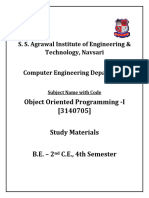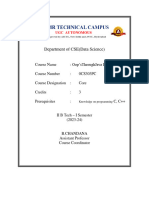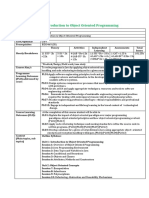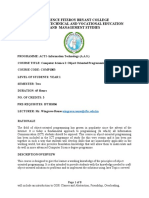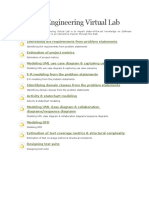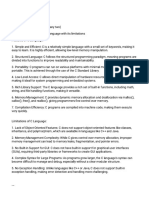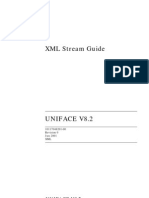0 ratings0% found this document useful (0 votes)
204 viewsObject Oriented Programming
This course introduces fundamental object-oriented programming concepts such as classes, objects, inheritance, encapsulation, and polymorphism. It covers topics like UML diagrams, object-oriented analysis and design, programming language fundamentals including data types, control statements, and arrays. The course emphasizes modern software engineering principles and includes graphical user interface programming and exception handling. It has 2 units, requires 6 contact hours per week, and Programming Logic and Design as a prerequisite.
Uploaded by
prince_kc2002Copyright
© © All Rights Reserved
We take content rights seriously. If you suspect this is your content, claim it here.
Available Formats
Download as DOCX, PDF, TXT or read online on Scribd
0 ratings0% found this document useful (0 votes)
204 viewsObject Oriented Programming
This course introduces fundamental object-oriented programming concepts such as classes, objects, inheritance, encapsulation, and polymorphism. It covers topics like UML diagrams, object-oriented analysis and design, programming language fundamentals including data types, control statements, and arrays. The course emphasizes modern software engineering principles and includes graphical user interface programming and exception handling. It has 2 units, requires 6 contact hours per week, and Programming Logic and Design as a prerequisite.
Uploaded by
prince_kc2002Copyright
© © All Rights Reserved
We take content rights seriously. If you suspect this is your content, claim it here.
Available Formats
Download as DOCX, PDF, TXT or read online on Scribd
You are on page 1/ 2
Course Name Object Oriented Programming
Course Description Introduces the fundamental concepts of programming from an object
oriented perspective .Topics are drawn from classes and objects,
abstraction, encapsulation , data types, calling methods and passing
parameters, decisions, loops arrays and collections, documentation,
testing and debugging, expectations, design issues, inheritance and
polymorphic variables and methods. The course emphasizes modern
software engineering and design principles.
Number of Units 2 units
for Lecture
Number of Contact 6 hours per week
Hour per Week
Prerequisites Programming Logic and Design
Program To be identified by the program.
Outcomes
Course Outcomes To be identified by the program.
Course Outline 1. Introduction to Object Oriented Programming and UML
1.1 Fundamental Concepts :Classes, Objects and Methods
,Inheritance, Encapsulation and Abstraction, Polymorphism
1.2 Unified Modelling Language (UML):Basic Concepts ,
Association, Aggregation, Composition and Multiplicity, UML
Diagrams
2. Object Oriented Analysis and Design
2.1 Cohesion and Coupling Concepts
2.2 Data –Driven Design
2.3 Responsibility –Driven Design
2.4 Object –Oriented Design Using UML
3. Programming Language Fundamentals
3.1 Coding Conventions and Data Types
3.2 Constants and Variables
3.3 Attributes, Methods and Constructors
3.4 Control and Iterative Statements
3.5 Characters and Strings
3.6 Arrays
4. Advanced Programming Language Fundamentals
4.1 Inheritance
4.2 Abstract Classes
5. Exception Handling
5.1 Understanding Errors and Expectations
5.2 Try, Catch and Finally
6. Graphical User Interface Programming
6.1 Forms and Widgets
6.2 Graphics ,Images , and Sound
6.3 Layout Managers
6.4 Event Handling
Laboratory Laboratory exercises to be identified by the program.
Experiments Each major topic should have a corresponding laboratory exercise.
For semestral program, 15 exercises per semester.
For trimestral program, 12 exercises per trimester.
For quarterm program, 9 exercises per quarter.
Laboratory Computer and object-oriented programming software tool
Equipment Depending on the class size
1 computer per student
You might also like
- Create A Paint Bucket Tool in HTML5 and JavaScriptNo ratings yetCreate A Paint Bucket Tool in HTML5 and JavaScript5 pages
- T4 14011102-4 Object Oriented ProgrammingNo ratings yetT4 14011102-4 Object Oriented Programming7 pages
- Silver Oak University: College of TechnologyNo ratings yetSilver Oak University: College of Technology5 pages
- Faculty of Informatics Department of Computer Science Course Title: Software Engineering100% (1)Faculty of Informatics Department of Computer Science Course Title: Software Engineering4 pages
- Superior University: Lesson Plan GuidelineNo ratings yetSuperior University: Lesson Plan Guideline17 pages
- Apt 3040: Object Oriented Analysis and Design & ProgrammingNo ratings yetApt 3040: Object Oriented Analysis and Design & Programming3 pages
- Syllabus: Topic: Basics of Software Development in C# Lecturer: Miloš Kosanović Course ObjectivesNo ratings yetSyllabus: Topic: Basics of Software Development in C# Lecturer: Miloš Kosanović Course Objectives15 pages
- MTechCSE Syllabus BOS 28 9 2021 Upload 13 11 2021No ratings yetMTechCSE Syllabus BOS 28 9 2021 Upload 13 11 202196 pages
- Object Oriented Programming Using Java: An Introduction To The CourseNo ratings yetObject Oriented Programming Using Java: An Introduction To The Course32 pages
- TLP - PROG1224 - Object Oriented Software Development-1No ratings yetTLP - PROG1224 - Object Oriented Software Development-110 pages
- Course Title: Object Oriented Programming: Course Learning Outcomes (Clos)No ratings yetCourse Title: Object Oriented Programming: Course Learning Outcomes (Clos)3 pages
- EEI3262 Introduction To Object Oriented Programming - Course SynopsisNo ratings yetEEI3262 Introduction To Object Oriented Programming - Course Synopsis2 pages
- COMP1003 Object Oriented Programming 2021-2022No ratings yetCOMP1003 Object Oriented Programming 2021-20229 pages
- AS1 - HUỲNH NHẬT NAM - GCS190293 - GCS0805BNo ratings yetAS1 - HUỲNH NHẬT NAM - GCS190293 - GCS0805B29 pages
- Mastering Advanced Object-Oriented Programming in Java: Unlock the Secrets of Expert-Level SkillsFrom EverandMastering Advanced Object-Oriented Programming in Java: Unlock the Secrets of Expert-Level SkillsNo ratings yet
- Computer Networks and Security LaboratoryNo ratings yetComputer Networks and Security Laboratory1 page
- COD-COE Instrument As of April 23, 2015 FinalNo ratings yetCOD-COE Instrument As of April 23, 2015 Final9 pages
- Computer Engineering Drafting and DesignNo ratings yetComputer Engineering Drafting and Design1 page
- Bibliography: You Are Suggested To Go Through Them For Further DetailsNo ratings yetBibliography: You Are Suggested To Go Through Them For Further Details1 page
- FPT University: Lab 3 For Operating SystemsNo ratings yetFPT University: Lab 3 For Operating Systems2 pages
- Jack N Shoemaker, Thotwave Technologies, Cary, NC: Proc Format in ActionNo ratings yetJack N Shoemaker, Thotwave Technologies, Cary, NC: Proc Format in Action6 pages
- Memory Tagging: A Memory Efficient Design: Aditi Partap Dan BonehNo ratings yetMemory Tagging: A Memory Efficient Design: Aditi Partap Dan Boneh16 pages
- UNIT - 5 - Regular Expression, Rollover and FramesNo ratings yetUNIT - 5 - Regular Expression, Rollover and Frames28 pages
- Installation Guide For Telegram Bot.V2.1 - HeaderNo ratings yetInstallation Guide For Telegram Bot.V2.1 - Header27 pages
- SAP Fiori On SAP Enterprise Portal - All You Need To Know On One PageNo ratings yetSAP Fiori On SAP Enterprise Portal - All You Need To Know On One Page3 pages
- Tm - Wl Hwid & Basic Inline Patcher 1.0No ratings yetTm - Wl Hwid & Basic Inline Patcher 1.018 pages
- Ariba Invoice Exception Knowledge Base ArticleNo ratings yetAriba Invoice Exception Knowledge Base Article2 pages
- ITE 399-Human Computer Interaction SAS#22No ratings yetITE 399-Human Computer Interaction SAS#222 pages
- Intro To The SysML v2 Language-Textual NotationNo ratings yetIntro To The SysML v2 Language-Textual Notation179 pages
- Syllabus: COSC 2006E: Data Structures I / Fall 2011No ratings yetSyllabus: COSC 2006E: Data Structures I / Fall 20112 pages


































